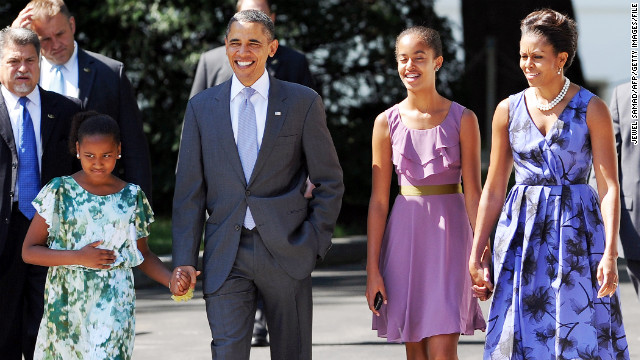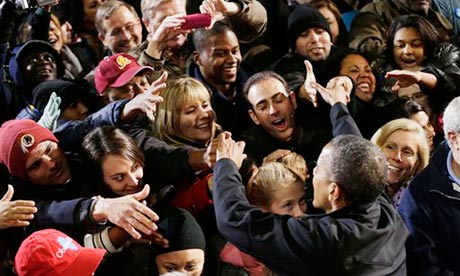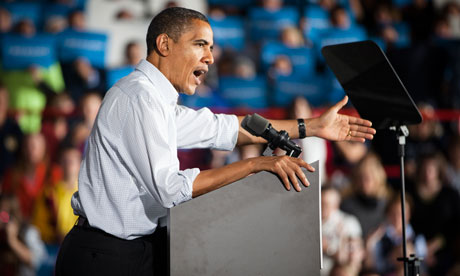

In 48 hours, after the expenditure of upwards of $2.5bn and an even greater outlay of human energy and toil, it will be done. The longest, the largest, the most important, the gaudiest and, it must be said, on occasion the silliest, exercise in elective democracy on the planet reaches its climax, as Americans finally make their choice between Mitt Romney and Barack Obama.
It may be asked at the outset whether either deserves the prize. Politics is a no-holds-barred trade in which truth and human kindness are invariably among the early casualties. But rarely has a presidential campaign been as unsatisfying as the one now drawing to a close. The incumbent has been relentlessly negative, the challenger consistently mendacious. Neither has deigned, beyond the most vacuous generalities, to tell those whose votes they seek what they propose to do if entrusted with office. In 2008, the promise of change was in the air, of youth, novelty and, however naively, a sense of cleansing. In the final stages, the winner was not in doubt.
Four years later, the reverse is true. The air is stale, "change" has been stripped of meaning, and of novelty there is next to none. The contest has pitted a Democratic incumbent who has fallen back to earth, perhaps inevitably, against a Republican who, at least until these past few weeks, was deemed to be running the worst campaign in modern times, failing to excite swathes of his own party, let alone the electorate at large.
And all this against the backdrop of what feels like a recession even if technically it isn't one; when Americans, by nature optimists, tell pollsters by a two to one margin that the country is on the wrong track, when the concentration of wealth is greater than at any time since the Crash of 1929 and when social mobility – a core element of the American Dream – is less than in scorned, sclerotic Europe. The mood is weary and expectations low. Often, the media are criticised for reducing US elections to horse races. But in Campaign 2012, the horse race has been the saving grace. For with just two days to go, the winner is still very much in doubt.
Set in an international context, that of itself is a small miracle. These are wretched times for incumbents everywhere. Since 2010, presidents and prime ministers have been thrown out in a host of US allies: France, Britain, Ireland, Greece, Italy, Spain among them. The US economy may have been marginally less dire, but why should an American president be spared the wrath that brought down his European counterparts?
Yet the oddsmakers favour Obama to win. Polls show support evenly split between the candidates, but when asked to name who they expect to win – a more accurate guide to the outcome than the question "who do you want to win?" – a clear majority of Americans say Obama.
That may reflect the fact that while Romney has a slight lead nationally, the President is ahead in a vital handful of states that will decide the outcome. It may also reflect the fact that Obama has, on the whole, been a pretty competent president. He's made his mistakes to be sure; by and large, though, he's been a safe pair of hands. His administration has been remarkably scandal-free. He may not be very good at buttering up recalcitrant lawmakers, but he was not to blame for the blanket opposition from Congressional Republicans from the day he was sworn in. Yes, he hasn't quite lived up to that absurdly premature Nobel Peace Prize of 2009, but he's made no foreign blunders either. One way and another, "GM is alive, and Osama bin Laden is dead," isn't a bad way to sum up one's record.
The problem has been his campaign, both the lack of substance, and the style of it. Obama has been trapped by his very rationality. After the tribulations of the last four years, he knew vague promises that things will get better would not suffice. Nor would reliance on Americans to accept he had inherited a terrible hand. So his team went negative, dismantling Romney, and replacing 2008's national movement with a steely focus on the swing states.
Inevitably, it wasn't pretty. But, thanks in good measure to Romney's ineptitude, the strategy worked, and until 3 October, he seemed to be coasting to a straightforward, if forgettable, win. Then came the first debate, which turned the campaign on its head. Obama came across as aloof and uninterested, almost contemptuous of his rival. Romney was not only crisp and commanding. The self-described "severe conservative" of the primaries had mutated into a moderate, a more than credible occupant of the Oval Office, anything but the greedy vulture capitalist who hadn't a clue how ordinary people lived, as the Obama people had portrayed him.
A glide to re-election turned into a desperate race, and it was Romney who now possessed what the elder Bush once called "the Big Mo". By last weekend, he was probably favourite to win. Then came Sandy. By common consent, Obama had a good storm. Big government, so reviled by Republicans, proved to be of some use after all, and the praise lavished upon him by Governor Chris Christie of New Jersey – who had delivered the keynote speech, no less, at the Republican convention – allowed the President to wrap himself in the mantle of bipartisanship.
Whether Sandy has changed many minds, it is impossible to say. Ditto, the jobs news on Friday, better than expected and suggesting that recovery is slowly gaining steam. But in a contest as close as this one, even one extra vote is precious.
Politicians, of course, always proclaim they are winning an election until it is certain they have lost. But usually a losing campaign's collective body language betrays the truth. Not this time. Both parties seem convinced they will win. Republicans believe "the cake is already baked", and that no amount of adept storm-management can save Obama.
Wavering voters, they insist, are breaking for Romney, just as they broke for Ronald Reagan in the closing phase of his 1980 campaign against Jimmy Carter – the election to which 2012 is sometimes compared. But Democrats have faith that their "firewall" of swing states is holding and the latest polls would seem to bear them out – just.
Everything now depends on the "ground game", on getting supporters to the polls, whether by electronic reminder or old-fashioned phone calls and door-to-door stumping by volunteers. But Tuesday could be a very long night. The results from the most close-fought states could be delayed by recounts or validation of provisional ballots, which, like Florida 2000, might end up in the courts. Nor is an electoral vote tie, 269 to 269, impossible.
Conceivably, too, we could see the reverse of 2000, this time with the Republican, more probably, winning the popular vote while Obama sneaks the electoral college and thus the White House. If so, the continuing existence of the college – an 18th-century anachronism that, in effect, confines the election to a dozen or so battleground states, and which in the space of 12 years twice stole victory from the winner of the national vote – would surely be indefensible. For once both parties, each having been gored by the beast, might make common cause to scrap it.
On one thing, however, they already agree: that this election is of extraordinary importance. In fact, of course, each US election is important, but its true significance is only clear in retrospect. Obama's triumph in 2008 was widely seen as a watershed, less because a black president had been elected, than as the end of four decades of Republican dominance.
If the President loses, however, that thesis will look hollow. All that may be said is that this is the most important election between 2008 and 2016 – and that, whatever the campaign trail hyperbole, Obama and Romney do not represent an existential choice between cradle-to-grave socialism and winner-takes-all Darwinian capitalism.
Yes, a Romney win would suggest that America's shift to the right continues, and that the Obama years were a short-lived interruption, as was Carter's single term before it. But victory for the incumbent would not signify an era of government run riot (Obama has shown scant appetite to take on Wall Street and big business). It would be acceptance of his argument that government has a role to play, and that, after so devastating a crisis, no president could restore the economy quickly.
Most important, even if either wanted to live up to his caricature, he couldn't. In the heat of a general election, it is easy to forget that even in normal times, an American president's power is limited. The system is built around checks and balances. He can order the invasion of Iraq (or Iran). But in domestic matters he must act through Congress.
Should Obama win, he will probably be dealing again with an obdurate Republican majority in the House of Representatives. And even if the Democrats retain control of the Senate (likely but by no means certain), they will fall far short of the 60-vote super-majority needed to pass anything of importance. Conversely, a Democratic Senate could thwart Romney at every turn, not least his vow to repeal Obama's healthcare reform.
But these are not normal times – or, more exactly, they're the new normal: a "50/50" country split into two roughly equal camps, a dysfunctional system of government in which special interests and lobbyists have more clout than ever, where the political centre ground has all but vanished, and where compromise is a dirty word. Add to that the constraints of the deficit, and the need to find a safe path back from the "fiscal cliff" looming at the end of the year, when the expiry of the Bush-era tax cuts and mandated deep government spending cuts both kick in, and the limits to a president's freedom of action are obvious.
American exceptionalism, the doctrine no presidential candidate dare disown, has it that the US is special, and thus uniquely equipped to solve problems which floor lesser countries. In this way, harsh home truths may be avoided on the campaign trail and 2012 has been no different. The reality check, for whoever wins, starts even before Inauguration Day on 21 January – and will be particularly abrupt for Mitt Romney.
The presidency is a job for which nothing can prepare you; how a candidate will perform in office can only be guessed. In Romney's case, his constant shifts of policy, his lack of any discernable ideology, make predictions doubly difficult. But tensions will probably quickly surface between his party's conservative wing and his own instinctive pragmatism. If Mitt Romney is anything, he is a results-driven businessman, the executive out to clinch a deal, who will not waste time banging his head against a brick wall. That was how he ran Democrat-dominated Massachusetts, and that is how, one suspects, he would run America.
If Obama wins, a no less intriguing question arises: of where a supremely rational and competent man, who will never worry about an election again, would seek to take America. At the very least, victory would consolidate his legacy, ensuring the survival of his biggest, if flawed, achievement, giving America something close to universal health care.
For the loser, though, politics will be over. Defeat for Romney would surely convince the conservatives who dominate the Republican party that the path to victory lies even further to the right. For Obama, defeat would signify the extinction of one of the most dazzling meteors to flash across American political skies, a man who travelled from virtually unknown state legislator in Illinois to defeated one-term president in the space of nine short years.
For a keenly competitive man, sure of his abilities, failure would be personally traumatic – and no less so for the Democrats. Youthful promise would have gained its comeuppance. Disillusioned and divided, his party might have little choice but to regroup around the hope of a Clinton restoration in 2016.
There is no guarantee of such salvation. This campaign may have been ugly, but the rewards of victory on Tuesday are huge. The 2008 winner was facing the worst economic crisis since the Depression, from which recovery would be slow at best. This time, the prospect is of steady growth, expanding employment and an improving national mood, for which the incumbent – whether Mitt Romney or Barack Obama – will take the credit. As of today the odds, fractionally, are that it will be the latter.














